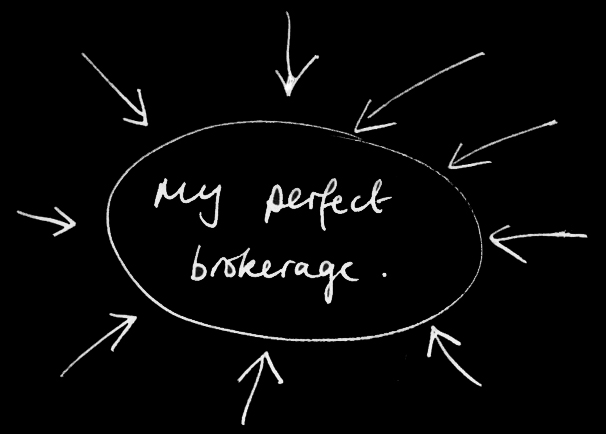Finding the best online brokerage

Finding the best online brokerage for the dividend investor means more than simply the lowest fees.
After all, if you're looking to buy and hold stocks long enough to take advantage of dividend growth, you'd better be sure that the brokerage you're using is going to be in existence years (perhaps decades) down the road.
Choosing the absolute cheapest broker and then watching it go out of business or discovering it has used your cash to settle its own debts is a real risk to your money. Yes, it is illegal, but it didn't stop MF Global from doing this in 2011, click here to read more!)
That said you'll also want to shop around for reasonable dealing costs and check the way the brokerage charges so that you don't end up paying hidden fees.
|
For me the key factors to look for when finding the best online brokerage are the following:
If you have large investments you may also want to spread the risk by having several different accounts. Signing up for an account with two, three or more different brokerages might not cost you anything, but could save you a fortune! Having multiple accounts will also give you more flexibility and allow you to move between accounts more easily. |
|
Finding the best online brokerage
Rule 1: Find a reliable company
There are dozens of online brokerages out there, so look for one that has a track record, one that has a reputable name in the market, and not a recent startup offering "too-good-to-be-true" dealing rates.
How to research?
Firstly make sure the brokerage you're considering is a member of a the regulatory body for your country:
|
Country USA
|
Regulatory body FINRA (Financial Industry Regulatory Authority) FCA (Financial Conduct Authority) MAS (Monetary Authority of Singapore) |
Link to check membership https://www.finra.org/about/firms-we-regulate |
Make sure you avoid off-shore brokerages based in small tax haven states as these will almost certainly not be covered by a compensation scheme and their regulatory bodies are probably going to be less stringent than those in mainstream countries.
Finding the best online brokerage
Rule 2: Compare fees
Dealing fees are the first costs you will wish to establish when you research brokerages. These vary widely from a flat fee per transaction (buy or sell) to a percentage, or even both.
Remember that brokerage fees increase your total cost of trading and diminish your returns, so it's important to get the right fit for your situation.
Discount brokerages charge a flat fee generally between $5-$20. For this you will trade online with no advice. This could be perfect for a well-informed investor.
"Full-service brokers" on the other hand offer a wider range of services generally charge 1-2% per transaction. Despite these higher fees, this may suit the investor who has complex tax affairs or needs help with estate planning.
You should also be aware of less obvious fees such as inactivity fees which may apply if you trade only very infrequently. Also there may be costs involved with transferring a portfolio of investments you currently hold into your account or in withdrawing cash.
Refer to each brokerage's website for the full details, or click here to see a simple fee comparison table.
Finding the best online brokerage
Rule 3: Test the customer services
You only really know whether a company has great customer services once you've used them, so why not use them before you sign up. Call a few of the customer services lines and ask a similar set of questions.
Chances are, you'll need some serious help with your account at one time or another, so it's best to feel confident about the support.
That's what we did when we reviewed online brokerages.
As a long-term dividend investor, you'll be more interested in accounts that DON'T encourage you to trade as often as possible. Give the advisors a call and ask about buy-and-hold accounts and whether there are inactivity fees.
Gauging their reaction and whether they are interested in promotion margin lending to leverage investments (this makes little sense if you intend to buy-and-hold) should tell you whether brokerages are really suited to the sort of trading you're engaged in.
Finding the best online brokerage
Rule 4: Trial the additional features
Many of the best online brokerages offer education about investment and stock data as part of their package.
Always keep in mind that brokerages earn their fees when you deal, so the more you deal the better. Not surprisingly therefore they prefer speculators who buy and sell often over buy-and-hold dividend investors.
Use the data and education material wisely, and beware of any advice that takes you away from your dividend growth path, including the offer of a telephone consultation with a share dealing "advisor" who may not share your objectives.
And finally: Rule 5: Weigh up the brokerage's "useful services"
Brokerages offer services such as end-of-year tax forms which make your life a whole lot easier. Each company offers a different list of options and some are free, while others are charged for.
However, always consider that brokerages make more money from someone who deals often, rather than a buy-and-hold investor, so always keep in mind that what constitutes "useful services" from the brokerage's point of view (i.e. something that encourages more trading activity) can be different from what you consider "useful services".
Research and consider these when you make you choice.
Got a BURNING dividend question for 6-figure dividend earner Mike Roberts?
What is it that you really want to know about investing?
Submit a query and Mike will write a page in response.
PLEASE NOTE - in accordance with our terms of use, responses are meant for education / interest only. We do not give specific financial advice.



